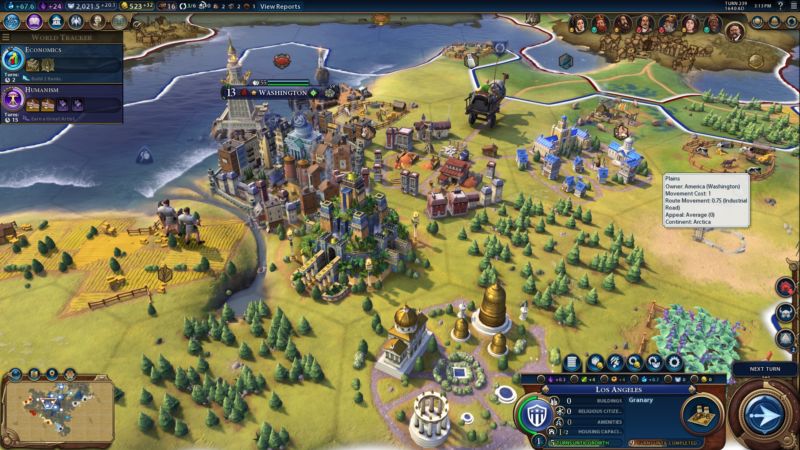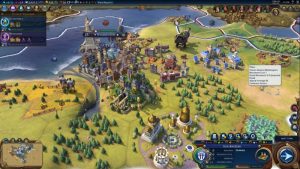Strategies for Success in Civilization VI


Strategies for Success in Civilization VI


Introduction
Civilization VI is a turn-based strategy game that challenges players to build and lead their civilizations to greatness. With multiple paths to victory and a vast array of civilizations to choose from, it can be overwhelming for newcomers to the game. In this comprehensive guide, we will delve into strategies and tips that will help you achieve success in Civilization VI. From early game decisions to diplomacy, city management, and military tactics, we’ll cover all the essential aspects of the game. By mastering these strategies, you’ll be well on your way to building a thriving civilization and securing victory.
Table of Contents
- Understanding the Basics 1.1. Overview of Civilization VI 1.2. Key Concepts and Terminologies
- Choosing Your Civilization 2.1. Understanding Unique Abilities and Bonuses 2.2. Matching Your Playstyle to Civilization Traits
- Early Game Decisions 3.1. Exploring and Expanding 3.2. Establishing a Strong Foundation 3.3. Balancing Expansion and Infrastructure
- City Management 4.1. Optimal City Placement 4.2. District Planning and Specialization 4.3. Managing Citizen Assignments and Improvements
- Technological and Civic Progression 5.1. Prioritizing Technologies and Civics 5.2. Planning for Great People and Wonders 5.3. Adopting Policies and Governments
- Diplomacy and Relationships 6.1. Establishing Relationships with Other Civilizations 6.2. Navigating Alliances and Diplomatic Agendas 6.3. Utilizing Diplomatic Actions and Trade Routes
- Military Strategies 7.1. Building and Maintaining a Strong Military 7.2. Defending and Expanding Your Borders 7.3. Waging Wars and Conquering Cities
- Victory Conditions 8.1. Understanding Victory Conditions 8.2. Tailoring Strategies to Victory Types 8.3. Seizing the Opportunity for Victory
1. Understanding the Basics
1.1. Overview of Civilization VI
Civilization VI is a turn-based strategy game where players lead a civilization from its early days to its modern age. The goal is to achieve one of the victory conditions, such as Domination, Science, Culture, Religion, or Diplomacy, depending on the chosen playstyle and civilization.
1.2. Key Concepts and Terminologies
Before diving into strategies, let’s familiarize ourselves with a few key concepts and terminologies used in Civilization VI:
- Civics: The social and cultural advancements that shape your civilization’s development.
- Technologies: The scientific advancements that unlock new units, buildings, and improvements.
- Great People: Influential historical figures that can provide unique bonuses to your civilization.
- Wonders: Extraordinary structures that offer significant bonuses and can only be constructed by one civilization in the world.
- Policy Cards: Cards that represent specific policies and can be equipped to provide various bonuses and benefits.
- Trade Routes: Routes between cities that generate income and provide other advantages.
2. Choosing Your Civilization
2.1. Understanding Unique Abilities and Bonuses
Each civilization in Civilization VI has unique abilities, units, and buildings that offer distinct advantages. When choosing your civilization, consider the following:
- Unique Ability: Every civilization has a unique ability that can greatly impact their playstyle. Familiarize yourself with these abilities and choose one that aligns with your preferredstrategy.
- Unique Units: Some civilizations have special units that excel in certain areas, such as combat, exploration, or production. Consider how these units can enhance your gameplay.
- Unique Buildings: Certain civilizations have unique buildings that provide powerful bonuses and advantages. Evaluate these buildings and how they can boost your civilization’s growth and development.
2.2. Matching Your Playstyle to Civilization Traits
Different civilizations excel in various aspects of the game. Consider your preferred playstyle and choose a civilization that complements it:
- Aggressive Expansion: If you prefer a militaristic approach and early game domination, civilizations like Rome or Aztecs may suit your playstyle.
- Cultural Development: For players who enjoy focusing on culture and tourism, civilizations like France or Greece can be excellent choices.
- Science and Technology: If you enjoy scientific advancements and technological progress, civilizations like Korea or Germany may be ideal.
- Diplomacy and Trade: For diplomatic victories and economic dominance, civilizations like Venice or the Netherlands are worth considering.
Choosing a civilization that aligns with your playstyle will maximize your enjoyment and success in the game.
3. Early Game Decisions
3.1. Exploring and Expanding
In the early game, focus on exploration to uncover valuable resources and potential city locations. Consider the following:
- Scout Units: Prioritize building scout units early on to explore the map, meet city-states, and discover valuable resources.
- City Settling: Found new cities in strategic locations near valuable resources, such as rivers, coastlines, or luxury/strategic resources.
- Map Awareness: Pay attention to the terrain, neighboring civilizations, and potential threats to plan your expansion and defense.
3.2. Establishing a Strong Foundation
Building a strong foundation is crucial for long-term success. Pay attention to the following aspects:
- Monument and Granary: Prioritize building a Monument to boost your civilization’s culture and a Granary to increase food production in your cities.
- Settler Production: Balance your production between military units and settlers to expand your empire while maintaining a defensive force.
- Early Technologies: Prioritize technologies that unlock key buildings, units, or resources, such as Agriculture, Animal Husbandry, or Mining.
3.3. Balancing Expansion and Infrastructure
Balancing expansion with infrastructure development is vital for long-term growth. Consider the following:
- Population Growth: Focus on growing your cities’ population by prioritizing food production and housing.
- Infrastructure: Build necessary infrastructure, such as Water Mills, Libraries, and Markets, to support your cities’ growth and development.
- Settler Production: Continue producing settlers to expand your empire while ensuring your existing cities have adequate infrastructure.
4. City Management
4.1. Optimal City Placement
Choosing optimal city locations is essential for maximizing the productivity of your cities. Consider the following factors:
- Resources: Settle cities near valuable resources like strategic resources, luxury resources, and bonus resources.
- Terrain: Look for advantageous terrain features like rivers, mountains, or natural wonders that provide additional bonuses to city production and growth.
- Defense: Consider the defensibility of the location, such as natural chokepoints or proximity to mountains, to protect your city from potential invasions.
4.2. District Planning and Specialization
Districts are key to the development of your cities. Plan your districts strategically and consider specialization:
- District Placement: Each district has specific adjacency requirements. Place districts near suitable terrain or other districts that provide adjacency bonuses.
- Specialization: Specialize cities by focusing on specific districts that align with your chosen victory condition. For example, prioritize Theater Squares for cultural victories or Campuses for scientific victories.
4.3. Managing Citizen Assignments and Improvements
Efficiently managing citizensand improvements in your cities maximizes their productivity. Consider the following:
- Citizen Assignments: Assign citizens to appropriate tiles based on their yields (e.g., food, production, gold) to optimize city growth and output.
- Improvements: Construct improvements like Farms, Mines, and Plantations on suitable tiles to enhance their yields and support city development.
- Housing and Amenities: Ensure your cities have sufficient housing and amenities to support population growth and avoid penalties.
5. Technological and Civic Progression
5.1. Prioritizing Technologies and Civics
Choosing the right technologies and civics is crucial for progress and advancement. Consider the following:
- Early Game Technologies: Prioritize technologies that unlock essential buildings, units, or resources relevant to your strategy.
- Beeline Technologies: Identify key technologies that provide significant advantages and focus on researching them quickly.
- Civic Synergy: Align your civic choices with your chosen technologies to unlock powerful policies and bonuses.
5.2. Planning for Great People and Wonders
Great People and Wonders can provide significant advantages in Civilization VI. Plan your progression accordingly:
- Great People Points: Generate Great People Points through various means, such as districts, buildings, policies, and city projects.
- Great People Utilization: Evaluate the abilities of Great People and strategically recruit those that align with your chosen victory condition or provide unique bonuses.
- Wonder Construction: Assess the benefits of wonders and consider constructing those that provide substantial bonuses to your civilization.
5.3. Adopting Policies and Governments
Policies and governments shape your civilization’s policies and provide bonuses. Consider the following:
- Policy Cards: Strategically choose policy cards that enhance your desired playstyle or provide significant benefits based on the current stage of the game.
- Government Types: Unlock and switch between different government types to adapt to changing circumstances and maximize your civilization’s potential.
6. Diplomacy and Relationships
6.1. Establishing Relationships with Other Civilizations
Diplomacy plays a vital role in Civilization VI. Establish relationships with other civilizations:
- Trade Routes: Establish trade routes with other civilizations to foster economic growth, generate income, and gain additional bonuses.
- Diplomatic Delegations: Send diplomatic delegations to other civilizations to improve relations and potentially gain benefits.
- Alliances and Friendships: Build alliances and friendships with other civilizations to secure support, trade deals, and military assistance.
6.2. Navigating Alliances and Diplomatic Agendas
Understanding other civilizations’ diplomatic agendas and managing alliances effectively is crucial:
- Agenda Assessment: Evaluate the diplomatic agendas of other civilizations to understand their motivations, likes, and dislikes.
- Diplomatic Agreements: Engage in diplomatic agreements, such as research agreements or open borders, to build trust and improve relations.
- Alliances: Forge alliances with civilizations that align with your interests and provide mutual benefits, such as military support or shared research.
6.3. Utilizing Diplomatic Actions and Trade Routes
Leverage diplomatic actions and trade routes for strategic advantages:
- Diplomatic Actions: Utilize diplomatic actions, such as denouncements, declarations of friendship, or emergency participation, to shape the political landscape and gain favor.
- Trade Routes: Maximize the benefits of trade routes by establishing routes with civilizations that offer lucrative trade deals or provide essential resources.
7. Military Strategies
7.1. Building and Maintaining a Strong Military
A well-built military is essential for defense and expansion. Consider the following:
- Balanced Composition: Create a balanced military composition with a mix of melee, ranged, and support units to handle various situations.
- Upgrades and Promotions: Continuously upgrade and promote your units to increase their effectiveness and survivability.
- Military Maintenance: Maintain a strong military presence to deterpotential aggressors and protect your cities.
7.2. Defending and Expanding Your Borders
Defending your borders and strategically expanding your territory is crucial for success. Consider the following:
- Defensive Structures: Construct defensive structures, such as city walls or encampments, to fortify your cities and deter attacks.
- Strategic Placement: Position units strategically along your borders and near key cities to protect against invasions and maintain control.
- Settler Escorts: When settling new cities, accompany your settlers with military units to protect them from potential threats.
7.3. Waging Wars and Conquering Cities
When engaging in warfare, consider the following strategies:
- Planning and Preparation: Assess the strength and weaknesses of your opponents before declaring war. Prepare your military and strategically plan your attacks.
- Target Priority: Identify key cities or units to prioritize in battles. Capture enemy cities strategically to cripple their production and secure valuable resources.
- Diplomatic Consequences: Be mindful of the diplomatic consequences of waging war. Consider potential alliances or repercussions that may arise from your actions.
8. Victory Conditions
8.1. Understanding Victory Conditions
Victory conditions determine the path to winning the game. Familiarize yourself with the different victory conditions:
- Domination: Achieve domination by conquering all other civilizations’ capitals and eliminating them from the game.
- Science: Achieve scientific victory by being the first civilization to successfully launch a spaceship to another planet.
- Culture: Achieve cultural victory by accumulating enough tourism to become influential over all other civilizations.
- Religion: Achieve religious victory by spreading your religion to become the predominant faith in the world.
- Diplomacy: Achieve diplomatic victory by accumulating enough diplomatic favor and successfully winning a diplomatic victory vote.
8.2. Tailoring Strategies to Victory Types
Based on your chosen victory condition, adapt your strategies accordingly:
- Domination: Focus on military strength, conquest, and city capture.
- Science: Prioritize technological advancements, space race projects, and scientific wonders.
- Culture: Emphasize cultural development, tourism generation, and acquiring great works of art and artifacts.
- Religion: Establish and spread your religion through missionaries and apostles, convert cities, and defend against rival religious influences.
- Diplomacy: Cultivate diplomatic relationships, accumulate diplomatic favor, and sway diplomatic victory votes in your favor.
8.3. Seizing the Opportunity for Victory
Monitor the progress of other civilizations and capitalize on opportunities:
- Diplomatic Leveraging: Exploit diplomatic opportunities, alliances, and favor to manipulate the diplomatic landscape in your favor.
- Rival Weaknesses: Capitalize on rival civilizations’ weaknesses or conflicts to gain an advantage.
- Timely Action: Be proactive and make strategic decisions to ensure you stay ahead of other civilizations in your pursuit of victory.
Conclusion
By implementing these strategies in Civilization VI, you can maximize your chances of success and build a thriving civilization. From early game decisions to city management, technological progression, military tactics, and diplomatic maneuvers, every aspect plays a crucial role in achieving victory. Remember, adaptability, foresight, and careful planning are key to overcoming challenges and securing your place in history. Good luck, and may your civilization prosper and triumph!








